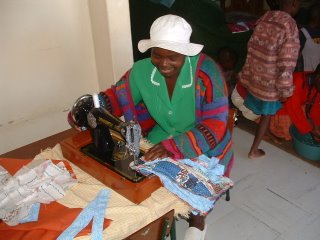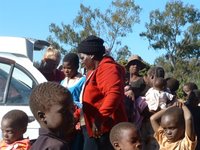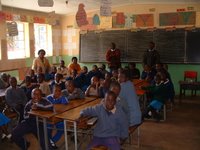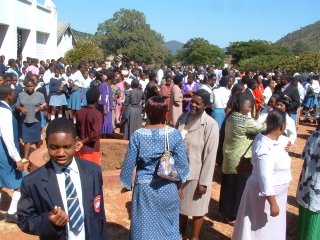PURSUING OPPORTUNITIES
Please allow me introduce Tanyaradzwa Magadaire (pronounced

mah-gah-dah-EAR-ee). Tanya is 19 years old and a Form VI boarding student at Hartzell High School. Early in our stay at Old Mutare, Tanya introduced himself and let me in on his ambition to study information technology in America and his desire to begin university education in the fall term, 2007. Since then, we have become friends.
Tanya’s home is in Mutare, 15 km from Old Mutare, where his father manages a manufacturing firm and his mother is employed by a company that specializes in school uniforms. He has an older sister and a younger sister who is a Form V student at Hartzell. His family is active in St. Peter’s United Methodist Church, and Tanya is a full member. He attended primary school in Mutare and did his O level (Forms I-IV) as a boarding student at Mutambara High School, also a United Methodist mission school, coming to Hartzell in January 2005 for A-level study. In November, he will take A-level examinations in Maths, Management of Business, and Accounting and has set challenging goals for his achievement. He often sleeps three or four hours early in the night, then studies in his classroom during the remainder of the night.
After he inquired about what is necessary for international students seeking to enrol in a U. S. college or university, I did a search on the Internet and passed on to him information about admission policies and visa requirements. What shook him most was that he must show he has at least $25,000.00 available for his school costs and personal support during one year of study. That much money is far beyond his or his family’s resources. Although he is nowhere near forsaking his dream, he is realizing that the fulfilment may be further into the future than he has hoped.
I tell you Tanya’s story, because his dream is like that of many students who have spoken to me here, yet it will become reality for few. Many face the possibility that after they complete A-level studies, which are intensely demanding, and have passed the gruelling A-level examinations, university study anywhere may be out of the question, costs being well beyond the means of their families. Still, they strive for excellence, knowing that without superior knowledge and high scores, their chances will surely wither. I have been deeply impressed by the determination and dedication of these superior young people.
Perhaps among my friends may be some who will choose to sponsor Tanyaradzwa, or another of these promising students, for a small, or large, part of the first year of American study. Possibly someone has information about scholarships or work/study programs that would trim the cost. I’ll be overjoyed to make the necessary connections and will assure you in advance that you will have the lasting admiration of an exceedingly grateful young person and, truly possible, a rewarding and lasting friendship as well.
PASSING ON SKILLS AND INSPIRATION
Last week, I spent several hours with sewing machines that reside in the houses at Fairfield Children’s Home. Some worked reasonably well, needing only minor adjustments. Three needed significant repairs; one awaits repair parts. This effort was prompted by the request of Cecilia Mabvumbe, an administrator at Fairfield, who was one of the star pupils in Annette’s quilting class and to whom Annette gave added personal instructions that took her further into the quilting process. With the help of Ruth Chimbwanda, our host, MaiMabvumbe wishes to soon begin a quilting class with the mothers of the Children’s Home houses, who are keen to get the class started. Of course, having sewing machines that sew well is essential, and now there are five.
I knew how thrilled Annette would be when she heard that bit of news in our telephone conversation Wednesday. I could detect her delight when she told me to pass on her thanks to Cecilia and Ruth for going on with the project she had begun. Her early intentions are about to come true, and her satisfaction is surely justified.
Another satisfying occurrence last week came about when Joab, one of my Form II students, asked for personal help with math. As we were ending an hour of work, he told me his dream to go into medical work, and then he said, “I want to be like your daughter (pronouncing the word as usual here, daw-TAIR).” Again, I was reminded how valuable one’s presence and influence is here, beyond what we could possibly expect. I am also confident that such influence is hardly possible until we place ourselves where we are closely in touch and open to friendship. I get many reminders of how valuable was Elizabeth and Abby’s visit and their willingness to join freely in the life of this community, and I am hugely grateful for those twelve special days.
BOUNCING ON THE 9N
The 9N Ford tractor is up and going, and what fun we are having with it. Not that the purpose of its donors is our fun, but perhaps they will not deny us our little pleasures. For three weeks, that little tractor has stood silently, because we had assumed the battery was dead. Finally, last Monday, I decided I would go to work on it myself, and I quickly discovered the battery was very much alive. A problem seemed to be that the battery connectors had not been cleaned of corrosion in a great many years. A small amount of cleaning, then tightening the connections securely, quickly showed me that the battery could turn over the engine easily.
However, there was another problem: the ignition key was not available. A little research developed the fact that the headmaster had the key in his possession, and he readily passed it on to me. Then came the defining moment: would the engine actually start running? I turn on the ignition, press the starter, and—Voila!—the engine immediately roars (well, that small engine does not exactly roar) to life. I then jump into the seat—not quite with the alacrity that I probably jumped into the seat 60 years ago—shift into second gear, and I am soon underway, but only for about 10 meters, when the engine dies, most likely, I guess, because its petrol tank is empty. With some help, the tractor is rolled back to its parking place to await the next step.
Petrol is a precious commodity here, usually unavailable, but Peter Mafuto, administrator of Fairfield Children’s Home, has enough us to make another attempt to energize the 9N. He appoints two Fairfield boys to accompany me back a kilometre or so to where the tractor is parked, each carrying one of the small containers with about three liters in each. We quickly pour the fuel into the tractor, and again it starts immediately. The two boys climb on and stand beside me, and we are off on our return trip to Fairfield Children’s Home. At about the half way point, we are met by a dozen of the older children from Fairfield, most wanting to jump on the tractor with us but finally content to run alongside. The tractor is the star as we arrive at the Children’s Home, with a crowd about us to admire it. Peter Mafuto takes his turn driving the tractor around the area before it is returned once again to its secure parking place.
The next development will be to attach some of the machinery that accompanied the tractor across the ocean from America, but that is for another day. Soon, too, I will see to it that all the children at Fairfield who wish to do so will get to ride in a wagon behind the tractor. Then, there will be pictures, and my 9N experiences will be complete.















